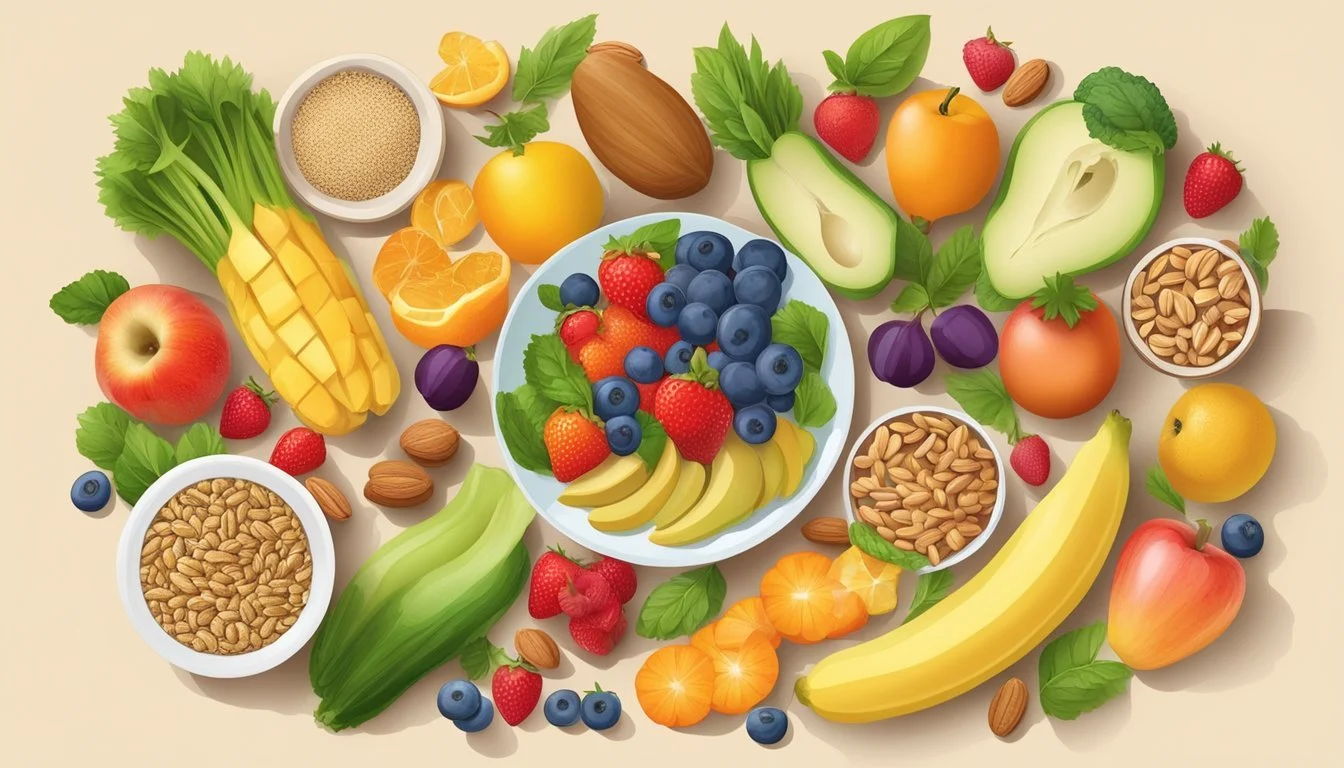The Truth About the Fertility Diet
Unveiling Its Impact on Conception Success
Exploring the connection between diet and fertility, a topic that has intrigued both hopeful parents and medical professionals alike, has given rise to the concept of a fertility diet. The principle behind this diet is that certain foods and nutrients can have a positive effect on reproductive health, thereby potentially improving the chances of conception. Central to this diet are foods rich in specific nutrients thought to play a role in hormonal balance and egg and sperm quality.
Nutrition has long been acknowledged as a cornerstone of good health, and it logically extends to the realm of fertility as well. A fertility diet often highlights the inclusion of dark leafy greens, complex carbohydrates, plant-based proteins, and healthy fats. Each of these components serves a purpose; for instance, complex carbohydrates are slowly digested, helping manage blood sugar levels and maintain a healthy weight, while omega-3 fatty acids found in certain fish are linked to improved sperm motility.
While the notion of a fertility diet is appealing, especially to those facing fertility issues, it is vital to approach it with a balanced perspective. Although a nourishing diet is one piece of a complex puzzle that is fertility, it is not a magic solution. It should be coupled with a healthy lifestyle and, when necessary, medical consultation. As research continues to uncover the precise roles of nutrition in conception, the importance of a balanced diet remains a consistent recommendation.
Understanding Fertility and Nutrition
A balanced diet rich in essential nutrients can influence reproductive health significantly. Research suggests that certain dietary patterns can be linked to fertility outcomes in both men and women.
The Impact of Diet on Reproductive Health
Diet plays a crucial role in reproductive health. Studies have shown that fertility can be affected by what individuals eat. For example, diets high in trans fats and refined carbohydrates may negatively impact fertility, whereas those that mimic Mediterranean dietary patterns, characterized by high intake of plant-based foods, whole grains, and healthy fats, are associated with better fertility outcomes. Being either underweight or overweight can also affect the reproductive system, influencing hormone production and ovulation.
Key Nutrients for Fertility
Certain nutrients are particularly important for maintaining good reproductive health:
Folic Acid: Supports ovulation and helps prevent birth defects.
Omega-3 Fatty Acids: Beneficial for hormone production and may improve egg quality.
Vitamin E: An antioxidant that can improve sperm health.
Iron: Low levels are associated with a lack of ovulation.
Focusing on a nutritious, well-balanced diet that includes these key nutrients can help improve overall fertility. Research in the area of nutrition and fertility continues to evolve, guiding dietary recommendations for individuals experiencing infertility.
Components of the Fertility Diet
The fertility diet involves specific food groups and nutritional approaches designed to potentially enhance fertility. The diet focuses on incorporating a variety of nutrients and maintaining a balanced dietary pattern while also recognizing foods that might be detrimental to reproductive health.
Crucial Food Groups and Substances
Whole Grains: They provide complex carbohydrates and essential fiber. Examples include:
Brown rice
Quinoa
Oats
Vegetables: Especially dark, leafy greens that are high in folate, such as:
Spinach
Kale
Swiss chard
Proteins: Both plant-based and animal proteins are included, focusing more on the former. Plant-based proteins are from sources like:
Lentils
Beans
Nuts
While animal proteins include:
Fish
Poultry
Healthy Fats: Specifically omega-3 fatty acids, found in:
Mackerel
Flaxseeds
Antioxidants: These help defend against cellular damage and are found in colorful fruits and vegetables.
Iron: Sources of iron can be both plant and animal-based, with an emphasis on non-heme iron from plants.
Recommended Dietary Patterns
The fertility diet advises a particular dietary structure that includes:
Frequent consumption of whole grains, at least half of all grains consumed
Daily servings of vegetables, aiming for variety and color
Regular intake of protein, with a preference for plant-based sources mixed with some animal protein
Inclusion of healthy fats, both in the diet and through supplements as needed
Foods to Avoid or Limit
A fertility diet also identifies certain foods and substances that should be minimized:
Processed Foods: High in unhealthy fats and additives
Excessive Diary: Select lower-fat options or consider moderation
Unhealthy fats: Such as those found in fried foods and certain snack products
Alcohol: Advised to be limited due to its potential negative effects on fertility
The Role of Weight Management in Fertility
Maintaining an optimal weight through a balanced diet and regular exercise plays a crucial role in fertility. Weight management can have a profound impact on an individual's ability to conceive, influencing both hormonal balance and reproductive functions.
Achieving a Healthy Weight for Conception
For individuals aiming to conceive, reaching a healthy weight is an essential first step. Achieving a healthy weight enhances hormonal balance and improves reproductive health. Losing weight, for those above the ideal weight range, can significantly increase the probability of getting pregnant. It's important to create a weight loss strategy that includes:
Nutritious Foods: Incorporate a variety of fruits, vegetables, lean proteins, and whole grains.
Regular Physical Activity: Engage in moderate exercise for at least 150 minutes per week.
Professional Guidance: Consult a healthcare provider or dietitian for personalized advice.
The Impact of Body Mass Index (BMI) on Fertility
Body Mass Index (BMI) is a measure used to determine whether individuals are in a healthy weight range. It is calculated based on their height and weight.
Normal BMI: 18.5–24.9
Overweight: 25–29.9
Obesity: BMI of 30 or higher
The fertility of women and men can be significantly influenced by BMI. Women with a BMI outside the normal range may experience menstrual and ovulatory irregularities, while men may have alterations in sperm quality. Conversely, a healthy BMI supports regular ovulation and increases the likelihood of successful conception.
The Influence of Age on Diet and Fertility
As individuals age, both egg and sperm quality decline, presenting challenges in natural conception as well as in assisted reproductive technologies. The connection between diet, age, and fertility has emerged as a crucial factor in the quest to enhance conception chances.
For women, as they approach their mid-30s, egg quality begins to diminish, a known consequence of aging. To mitigate this, a nutrient-rich diet is advocated, emphasizing dietary fiber and omega-3 fatty acids, which are found in the Mediterranean diet. This dietary pattern has been associated with improved fertility outcomes.
Men are not immune to the passage of time. While their fertility more gradually declines, the quality of sperm can be impacted by both age and dietary choices. For instance, diets high in antioxidants are thought to protect sperm integrity, an important consideration for men aiming to maintain reproductive health over time.
Here's a snapshot of key nutrients and their impact on reproductive health:
Nutrient Potential Impact on Fertility Dietary Fiber Linked to better hormone regulation Omega-3 Fatty Acids May improve egg quality Antioxidants Essential for sperm integrity
The body’s operational efficiency in processing these nutrients may also decrease with age, thereby making dietary choices more pronounced in their effects. While evidence underscores the benefit of nutrition counseling across reproductive ages, maintaining a healthy weight and avoiding excessive vitamins are universally recommended.
In conclusion, for those at advanced reproductive age, a deliberate focus on diet presents a non-invasive way to potentially improve odds of conception, highlighting the interplay between diet and fertility across the lifespan.
Lifestyle Factors Affecting Fertility
Lifestyle choices are directly linked to fertility health in both men and women. Key behaviors such as consumption of alcohol, caffeine, tobacco, as well as exercise habits and stress management, can significantly impact an individual's ability to conceive.
Alcohol, Caffeine, and Tobacco
Alcohol: Moderate to heavy alcohol consumption is associated with reduced fertility in women. For men, it can lead to problems with sperm quality and count. The American Society for Reproductive Medicine recommends that women trying to conceive should avoid alcohol.
Caffeine: Excessive intake of caffeine, typically found in coffee, tea, and certain sodas, may also be related to fertility issues. Studies suggest limiting caffeine to less than 200 mg per day, equivalent to about one 12-oz cup of coffee.
Tobacco: Smoking tobacco has been linked to lower fertility rates due to its impact on egg and sperm health. It's widely advised for individuals looking to improve fertility outcomes to quit smoking.
Physical Activity and Exercise
Regular exercise is beneficial for overall health and can improve fertility. However, excessive high-intensity workouts may have the opposite effect, especially in women, as it can lead to irregular menstrual cycles. Men are advised to avoid activities that may elevate scrotal temperatures, which can impair sperm production.
Stress Management
Chronic stress can negatively affect fertility by disrupting hormonal balance and ovulation. Effective stress management techniques include mindfulness, yoga, and appropriate professional support. It is essential for people trying to conceive to find healthy ways to manage stressors in their daily lives.
Fertility Boosting Supplements and Vitamins
Fertility can be influenced by various factors, including dietary intake of certain vitamins and minerals. Supplements can play a crucial role in this context, particularly when they contain key nutrients known to support reproductive health.
Essential Vitamins and Minerals for Conception
Adequate levels of specific vitamins and minerals are paramount for those trying to conceive. Folic acid, a synthetic form of folate, is essential for DNA synthesis and can significantly reduce the risk of neural tube defects in a developing fetus. It is recommended to take a multivitamin containing at least 400 mcg of folic acid daily when trying to conceive.
Vitamin D has been linked to fertility in studies, with lower levels associated with decreased likelihood of conception. The optimal blood level of vitamin D for those trying to conceive has not been definitively established, but maintaining sufficient levels is considered beneficial.
Omega-3 fatty acids, which are typically found in fish oil supplements, play a role in regulating hormones and improving egg quality.
Iron sourced from fruits, vegetables, and beans is important for preventing anemia, which can affect fertility. Supplements should be chosen carefully to ensure they provide iron in a form that is gentle on the stomach and easy to absorb.
When to Consider Prenatal Vitamins
Prenatal vitamins benefit those trying to conceive and during pregnancy. These supplements are formulated to support the increased nutritional demands of pregnancy and contain key nutrients, including folic acid and iron. They often include an array of B vitamins as well. Women are advised to start taking prenatal vitamins when they begin trying to conceive to ensure that they and their future child have adequate nutritional support from the very start of the pregnancy.
It is advisable to choose a prenatal vitamin that:
Provides at least 400 mcg of folic acid.
Contains iron to support the increased blood volume during pregnancy.
Includes vitamin D and B vitamins for overall maternal and fetal health.
Has Omega-3 fatty acids, such as DHA, for fetal brain development.
Assessing Fertility Diets: Expert Opinions and Research
Current research and expert recommendations form the cornerstone of understanding fertility diets. They provide a clear basis for evaluating the potential impact of nutrition on conception.
Analyzing the Science Behind Fertility Diets
Scientific investigation into fertility diets often emphasizes whole-diet approaches over individual nutrients, acknowledging their complex interactions. Registered dietitians and fertility experts analyze patterns that may enhance reproductive outcomes. Studies typically suggest the importance of a diet rich in vitamins, minerals, and antioxidants that support overall health and potentially improve fertility. However, it is important to note that while associations have been found, causality remains less clear due to diverse methodologies and participant differences.
Key factors under scientific scrutiny in relation to fertility diets include:
Trans fats: High consumption linked with negative fertility outcomes.
Refined carbohydrates: May affect metabolic disturbances.
Added sugars: Overconsumption is advised against due to potential adverse effects.
The Mediterranean Diet and Fertility
The Mediterranean diet, characterized by high intake of vegetables, fruits, whole grains, and healthy fats, has received attention for its potential positive effect on fertility. Experts point to its balance of nutrients as being conducive to both male and female reproductive health. Research suggests an improvement in pregnancy and live birth rates when adhering to diet patterns similar to the Mediterranean style. It's worth mentioning that while these studies support the diet's benefits, definitive conclusions are often moderated by individual differences in study participants.
Fertility Diets for Men and Women
Fertility diets focus on improving reproductive outcomes by optimizing the nutritional intake for both men and women. These diets aim to enhance sperm and egg quality through specific nutrients that support reproductive health.
Nutrition for Male Fertility
Zinc: Men should pay attention to their zinc intake, as it is crucial for sperm production and testosterone synthesis. Oysters are an excellent source of zinc.
Antioxidants: They play a role in protecting sperm from cellular damage and improving sperm quality. Foods rich in antioxidants include berries, leafy greens, and nuts.
Omega-3 fatty acids: Found in fish and flaxseeds, they are important for sperm membrane integrity.
Optimizing Female Fertility Through Diet
Folate and Vitamin B12: Women are advised to consume adequate folate and vitamin B12, especially when ovulating, to improve egg quality and reduce the risk of birth defects. Leafy greens and fortified cereals are good sources.
Unsaturated Fats: Diets high in unsaturated fats, found in avocados and olive oil, are associated with improved fertility.
Iron: It's recommended for women to maintain sufficient iron levels from sources like lentils and spinach to support ovulation.
Special Considerations in Fertility Diets
Fertility diets often form an integral part of managing reproductive health issues. Such diets are tailored to address specific conditions and are designed to potentially improve the chances of conception.
Fertility Diets for Individuals With PCOS
Polycystic ovary syndrome (PCOS) is a hormonal disorder that can impact fertility. For individuals with PCOS, maintaining a diet that promotes hormonal balance is crucial. Key dietary adjustments include:
Low Glycemic Index Foods: Emphasis on whole grains, legumes, and certain fruits to lower insulin levels and manage weight.
High Fiber: Fiber helps reduce insulin spikes by slowing digestion, aiding in weight management, which is important for PCOS management.
Dietary Intervention in Cases of Ovulatory Infertility
Ovulatory infertility, the inability to produce viable eggs for fertilization, is another area where diet plays a role. Nutritional considerations include:
Balanced Fats: Incorporating more monounsaturated fats while reducing trans fats to improve ovulatory function.
Plant-Based Protein: Substituting animal protein with vegetable sources to possibly reduce the risk of ovulatory infertility.
The Role of Diet in IVF Success
Diet is a modifiable factor that might influence in vitro fertilization (IVF) outcomes. Dietary strategies may include:
Mediterranean Diet: High in whole grains, fish, fruits, vegetables, and olive oil; associated with improved reproductive success.
Omega-3 Fatty Acids: Found in seafood and flaxseed, these may aid hormonal balance and embryo quality.
Developing a Personalized Fertility Diet Plan
When couples are striving to conceive, the role of nutrition and a healthy lifestyle cannot be overlooked. A fertility diet plan is individualized, yet grounded in the principle of incorporating nutrient-rich foods and making lifestyle changes that promote reproductive health. To develop such a plan, one must consider the inclusion of specific food groups known to benefit fertility.
Key Components of a Fertility Diet:
Whole grains: These complex carbohydrates provide sustained energy and fiber.
Leafy greens and vegetables: Rich in essential vitamins and minerals, they support hormonal balance.
Plant-based proteins: Beans, nuts, and seeds are excellent sources.
Healthy fats: Avocado, olive oil, and fatty fish contribute to hormonal health.
Besides diet, integrating an exercise plan that supports, but doesn’t strain, the body is crucial. Moderate, consistent activity like brisk walking or yoga can benefit fertility without causing undue stress.
Lifestyle Adjustments for Optimal Fertility:
Manage stress: Techniques such as meditation or mindfulness help reduce stress which is vital for hormonal balance.
Adequate sleep: Ensuring sufficient and quality sleep aids in the regulation of critical fertility hormones.
When personalizing a fertility diet, it's important to maintain balance and moderation, avoiding fad diets that promise quick results. Consulting healthcare providers or dietitians specialized in fertility can also provide guidance tailored to individual health needs and conditions. They can help in making the necessary healthy lifestyle changes that complement the nutrition aspect of the fertility journey.
Conclusion: Empowering Your Fertility Journey Through Diet
Adopting a fertility diet can be a proactive step in nurturing one's reproductive health. Multiple studies indicate that what one consumes has a tangible impact on fertility. Couples may consider integrating key elements of a fertility-friendly diet into their daily routine.
Key components of a fertility diet include:
Omega-3 fatty acids: Found in fish and flaxseeds, they support hormone function.
Plant-based proteins: Beans and legumes are excellent for overall fertility.
Whole grains: They help maintain stable blood sugar levels, benefiting hormonal balance.
Fruits and vegetables: High in antioxidants, they protect reproductive health.
Healthy lifestyle changes to accompany dietary adjustments contribute to an environment conducive to conception. These include maintaining a balanced weight, moderating caffeine intake, and reducing alcohol consumption.
It is essential to recognize that individual experiences with fertility are highly personal. While diet plays a role, it intersects with other factors including genetics, lifestyle, and medical conditions. Couples should consult healthcare providers to tailor their nutritional approach to their unique needs.
Finally, embracing a healthy diet is not a guaranteed solution for fertility challenges but can be part of a multi-faceted strategy to enhance overall reproductive health. Small, consistent changes in diet may have a positive effect on conception chances and well-being.




